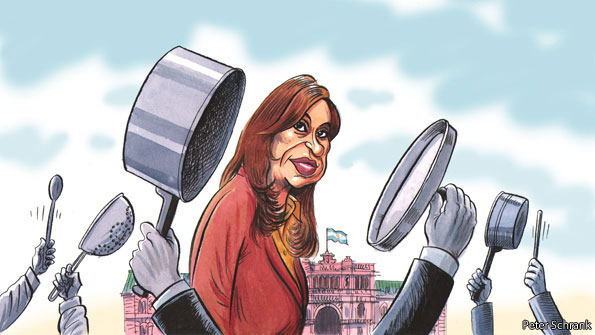[fblike]
 Prior to the First World War in 1914, Argentina’s economy was considered one of the top ten in the world. Following the war, which disrupted the country’s economic advantages in trade, the country has experienced political upheaval, corruption, and pursued poor economic policies that have eroded what was once a beacon of wealth in Latin America. In 2002, the nation experienced the largest sovereign debt default in history and twelve years later some economists are fearing that it is heading down the same road. President Cristina Fernandez de Kirchner, who took power in 2007, has enacted populist economic reforms while attempting to consolidate her rule. However, these policies have eroded foreign investment, sparked high inflation, and are now beginning to create political unrest that threatens her hold on power. Extempers who read our brief earlier this season on Venezuela’s municipal elections will find some similarities between its economy and Argentina and this brief should be a useful tool for extempers that have to talk about the Argentinean economy or the rise and fall of populist and leftist policies in Latin America.
Prior to the First World War in 1914, Argentina’s economy was considered one of the top ten in the world. Following the war, which disrupted the country’s economic advantages in trade, the country has experienced political upheaval, corruption, and pursued poor economic policies that have eroded what was once a beacon of wealth in Latin America. In 2002, the nation experienced the largest sovereign debt default in history and twelve years later some economists are fearing that it is heading down the same road. President Cristina Fernandez de Kirchner, who took power in 2007, has enacted populist economic reforms while attempting to consolidate her rule. However, these policies have eroded foreign investment, sparked high inflation, and are now beginning to create political unrest that threatens her hold on power. Extempers who read our brief earlier this season on Venezuela’s municipal elections will find some similarities between its economy and Argentina and this brief should be a useful tool for extempers that have to talk about the Argentinean economy or the rise and fall of populist and leftist policies in Latin America.
This brief will provide a brief history of Argentina’s economy, discuss its current economic problems, and then address what the government is doing and what it should do to avoid further economic calamity.
Readers are also encouraged to use the links below and in the related R&D to bolster their files about this topic.




 Here is today’s premium R&D to accompany
Here is today’s premium R&D to accompany